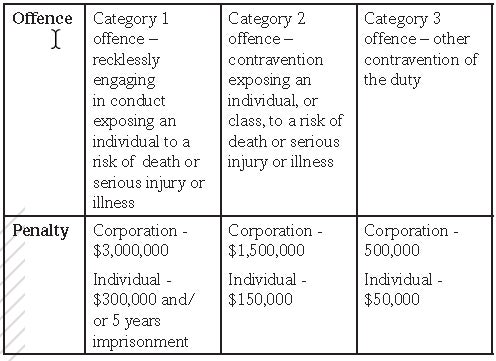26 February 2018
4 min read
#Transport, Shipping & Logistics
Published by:

One of the most significant changes coming for the heavy vehicle industry this year is the introduction of category 1 – 3 offences and penalties which mirror existing offences under the (almost) national Work Health and Safety (WHS) regime.
In this article we take a look at how the WHS penalty regime has been implemented for some insight into how the new penalties are likely to operate in the heavy vehicle space.
Similar to the new Heavy Vehicle National Law (HVNL) ‘primary duties’, under WHS law a person conducting a business must ensure, so far as is reasonably practicable, that the health and safety of other persons is not put at risk from work carried out as part of the business. If this primary duty is breached by the person recklessly and without reasonable excuse engaging in conduct which exposes an individual to a risk of death or serious injury or illness, the person may be convicted of a category 1 offence. The prosecution must prove the offence beyond a reasonable doubt.
For a court to convict a person or corporation for a category 1 offence, the prosecution must prove that the conduct was reckless and without reasonable excuse, and that the person/corporation failed to do what was 'reasonably practicable’ to ensure the health and safety of workers (under the incoming HVNL, a person is required to ensure the safety of transport activities).
If a person is ‘reckless as to the risk to an individual of death or serious injury or illness’, it means that they foresee that the risk of death/serious injury or illness is probable, but is indifferent as to whether it occurs. Proving both that a person foresaw the risk and was indifferent to it requires significant and clear evidence, and places a heavy onus on the prosecution.
Refresher – new penalties

WHS category 1 prosecutions
Since the Model WHS Act was rolled out across Australia (except WA and Victoria) in 2012-13 there have been few category 1 prosecutions and no convictions to date.
In the ACT, Schwing Australia Pty Ltd and NSW engineer Phillip James O'Rourke were charged with category 1 offences after a concrete pump collapsed, killing one worker and seriously injuring two others. In 2015 the Director of Public Prosecutions dropped the charges as it considered it could not prove the defendants contravened their WHS duties beyond a reasonable doubt in the face of the expert evidence which indicated the accident was caused by a metallurgical phenomenon rather than negligence of the defendants.
In South Australia, Safe is Safe Pty Ltd and director Hamish Munro were charged with category 1 offences after an amusement ride malfunction caused the death of an 8 year old girl at the 2014 Royal Adelaide Show. The matter has been referred to the South Australian Industrial Court and will be heard in April 2017, with the defendants arguing their duty ended prior to the incident.
In NSW, Cudal Lime Products Pty Ltd and two of its workers are facing category 1 charges relating to the death of a worker by electric shock, sustained while he was in the shower in his residence. The house’s electricity was supplied by the nearby limestone quarry and the NSW Department of Industry’s Resources Regulator alleges that the incident was caused by non-compliant electrical work combined with the absence of critical electrical safety devices.
Most recently, Lavin Constructions Pty Ltd and Multi-Run Roofing Pty Ltd and their directors Peter Lavin and Gary Lavin have been committed to stand trial for category 1 offences in relation to a worker’s fatal fall from a roof. Safety equipment scissor lifts for fall control were available, but the worker was working meters ahead of them and was not wearing a fall-prevention harness.
Comment
The various WHS agencies are clearly willing to bring category 1 prosecutions, but acknowledge that the evidential burden on the prosecution is heavy. The small number of prosecutions shows that it is considered to be a last resort and only appropriate in the most serious of cases.
Even if the prosecution is unable to prove the offence, being charged with a category 1 offence can have a devastating impact on a person or company. Defending such litigation is a time consuming and expensive process, and the reputational damage can be irreparable – for example, in 2016 the Royal Adelaide Show informed prospective ride suppliers that it would not accept safety certifications from Safe is Safe Pty Ltd ‘until further notice’, even though the company has not been convicted.
In order to be ready to uphold the new primary duties when they become law, you should review your policies and procedures to ensure they reflect the duty to do everything reasonably practicable to ensure the safety of all transport activities.
Author: Geoff Farnsworth
* A version of this article was originally published in CoR Adviser. This article is © 2017 Portner Press Pty Ltd and has been reproduced with permission of Portner Press.
Disclaimer
The information in this publication is of a general nature and is not intended to address the circumstances of any particular individual or entity. Although we endeavour to provide accurate and timely information, we do not guarantee that the information in this newsletter is accurate at the date it is received or that it will continue to be accurate in the future.
Published by: